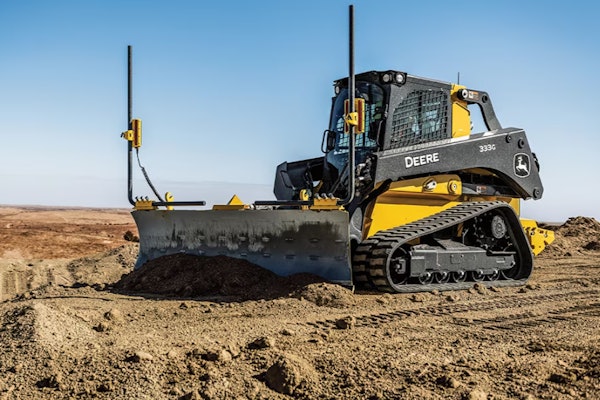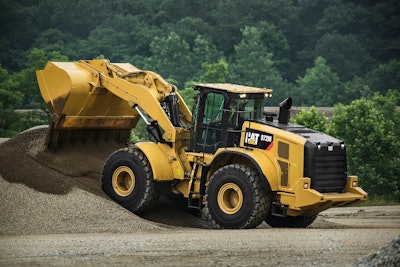
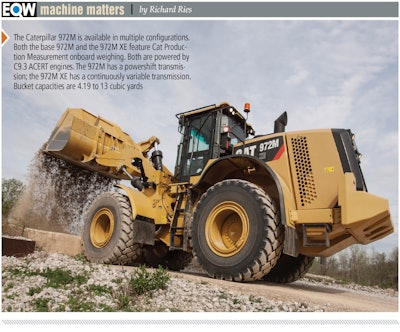
Wheel loaders work in many applications, but mostly they’re production machines – loading trucks, transferring materials. OEMs have taken steps to ensure wheel loaders excel at these core competencies, but they have also expanded their functionality.
The result has benefited traditional wheel loader customers who use their machines for production work. But it has also helped the smaller percentage of customers who use loaders in less demanding ways.
Such machine advancements include onboard weighing and increased operator comfort, along with improvements in design and technology.
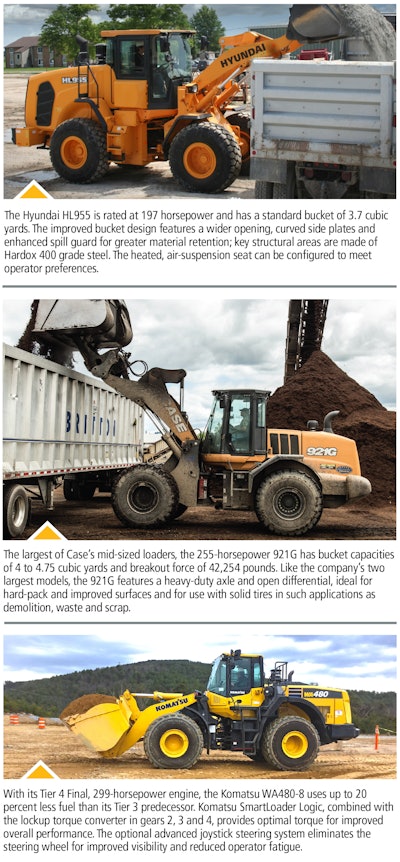
Onboard weighing
Onboard weighing systems continue to evolve, but the offering is inconsistent and availability remains spotty. Some manufacturers provide proprietary systems on all models of their loaders from the factory. Some offer a third-party system through their dealers. And some offer no system at all from any source.
Why the discrepancies?
Customer acceptance of onboard weighing – which is designed to make work smoother and production data easier to track – is growing and demand is increasing. But it’s still far from universal. OEMs know some customers don’t want onboard weighing and will resent having its cost baked into the initial investment. It could also lead them to switch to a competitor.
Then there’s the risk of offering a brand of onboard weighing incompatible with the customer’s information systems. AEMP telematics standard ISO 15143-3 has been in place for a couple of years and will eventually solve the communication incompatibility issue, but it hasn’t had time to do that yet.
And finally, customers who haven’t done an analysis or at least some fundamental research may not appreciate the benefits of onboard weighing.
Hyundai is among the manufacturers offering onboard weighing across their line. Marketing manager Corey Rogers says all HL900 Series 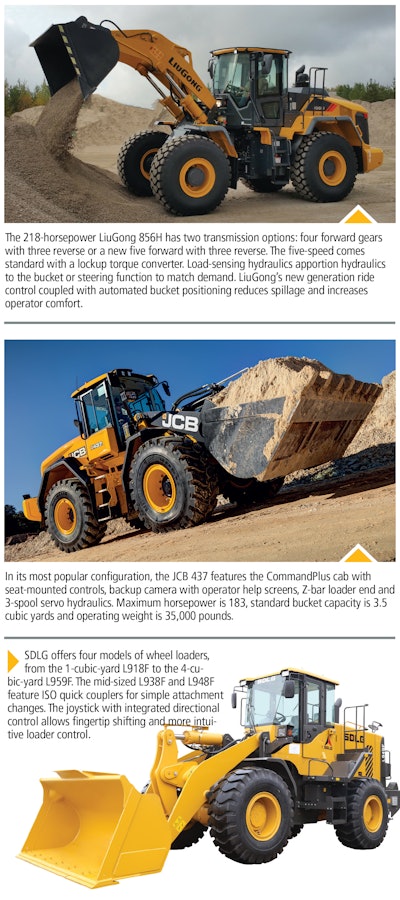
The Hyundai system is accurate to plus or minus 1 percent. It offers automatic and manual settings for monitoring both individual and cumulative bucket weight loads. The system uses rotary position sensor technology based on hydraulic system pressure measurements when the bucket is empty and full.
John Deere, drawing from a long association with Trimble, offers the Loadrite L2180 scale system as an option on all models, from the 444K to the 944K. The system uses a boom position sensor plus pressure sensors in the boom circuit to determine payload. By integrating with JDLink telematics, Loadrite provides production information in real time.
Matt Miller, product consultant 4WD loaders, John Deere, says that by refining the terms, it’s clear that onboard weighing systems are seeing strong demand. “We wouldn’t say that development is sporadic nor that availability is spotty. We have a very high take rate on this option for our production class loaders, as nearly every loadout loader on the market has a scale system installed to maximize machine productivity.”
Caterpillar has offered a version of onboard weighing on wheel loaders since the mid-1990s, 
Rupert Bradley, JCB wheel loader product manager, says JCB decided not to offer onboard weighing. Because customers have strong brand preferences for onboard weighing systems, often based on what they’re already using, JCB leaves it to the dealer to work with the customer to select and install the preferred system. “Production applications are constantly evolving,” says Bradley, “and we will continue to review the matter.”
Aaron Kleingartner, Doosan marketing manager, said Doosan was finalizing the details for an onboard-weighing feature. A partnership concerning the system is expected to be announced soon. The system would be installed by the dealer before the loader is delivered to the customer.
SDLG does not use onboard weighing for a different reason: their business model is to deliver reliable equipment with minimal frills and technology, and onboard weighing doesn’t fit that model.
“Our machines are capable of production work,” says Nick Tullo, sales manager, “but they’re not targeted at that. Eighty percent of our customers run their loaders 1,500 hours per year or less, and half run them 1,000 hours or less.”
All-day comfort
The same production environment that extracts value from onboard weighing puts a premium on comfort.
“The operator environment was one of the cornerstone elements of the Case wheel loader redesign that culminated in the G Series,” says Andrew Dargartz, product marketing manager, Case Construction Equipment. “We aimed for an automotive feel, and not just aesthetically.”
These features include the redesigned steering column, new LCD display, large membrane-switch keypad that replaces the rocker switches in previous models, Bluetooth connectivity, more storage areas and the single-pane, curved front windshield.
The Operator Guidance System on Komatsu loaders also aids operator comfort. “Our monitors have built-in messages that can enhance operator performance,” says Bruce Boebel, senior product manager for wheeled products at Komatsu America. “The machine is making suggestions that can improve efficiency.”
Comfort extends to service functions. Jason Hagedorn, product application specialist, Caterpillar, says Cat offers ground-level access to all key fluid fills, including DEF and central lube, as well as grouped components such as the hydraulic tank drain, hydraulic test ports, and kidney-loop and transmission filters.
Owners seek comfort, too, says Eric Yeomans, product manager, wheel loaders, Volvo. They find comfort mainly in maximizing their production and protecting their investment.
Features such as the Volvo Smart Control function, which ensures the correct torque in all situations and improves harmony between the engine and hydraulic system, help maintain peak production. So does the optional lockup torque converter, which yields up to 25 percent better fuel efficiency plus faster cycle times.
Other advances
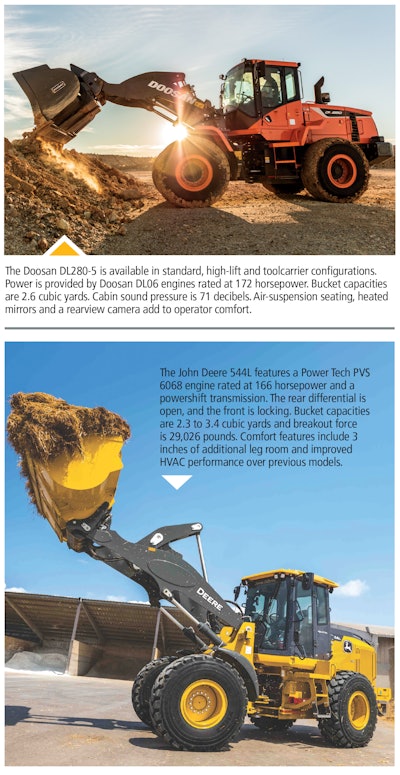
Advanced technology is apparent in the Volvo OptiShift system, which allows operators to customize the lockup engagement of their machines. With this control, lockup is used for more of the work cycle, which reduces fuel consumption.
Chris Cline of John Deere says three exclusive electrohydraulic control system features are found on the new John Deere 524, 544 and 624 L-Series loaders. Savable attachments settings allow operators to call up optimal hydraulic control settings for specific attachments in specific applications. A bucket vibrate feature helps evenly meter or spread material with the push of a button. And two programmable multifunction buttons allow the operator to assign one of 10 settings to each of the buttons.
Case loaders use a high-efficiency cooling cube. Because there is no stacking, fresh air hits all the cooling faces. Models 521G through 921G use a mid-mount design for the cooling cube, while the 1021G and 1121G use a rear-mount design.
The All-Around View Monitoring (AAVM) system that has been an available option on Hyundai HX Series excavators since October 2015 is now available for HL900 Series wheel loaders. The four-camera AAVM system provides a 360-degree virtual view of the jobsite. AAVM includes Intelligent Moving Object Detection (IMOD) that alerts the operator when objects are within a preset distance of the machine.







